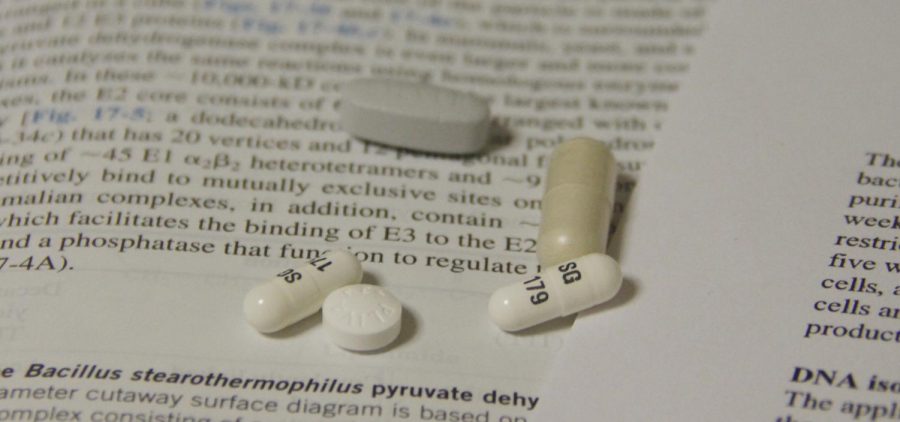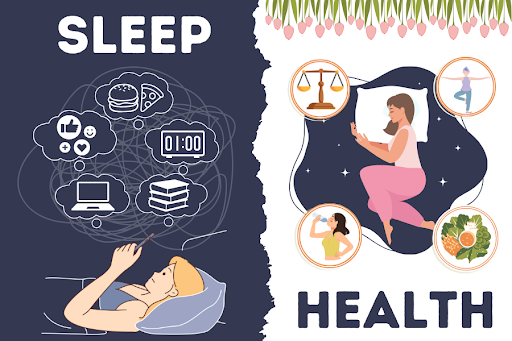Study with drugs and anxiety
Zachary Araki/The Lion's Roar
Drugs such as Adderall, Ritalin, Concerta and Focalin are commonly used to improve focus while studying. These drugs work by increasing the release of chemicals like dopamine and norepinephrine.
To overcome the pressure for academic excellence, some students turn to stimulant drugs for increased focus when studying.
Prescription stimulant medications, also termed “study drugs,” “smart drugs” or “uppers,” can be used improperly by the prescription holder or illegally by a person without a prescription. Common drugs include Adderall, Ritalin, Concerta and Focalin. These drugs work by increasing the release of dopamine and norepinephrine.
According to Andrea Peevy, nurse practitioner and director of the University Health Center, the most common adverse reactions to the drugs are headaches, insomnia, loss of appetite, anxiety, agitation, dizziness, increased heart rate, elevated blood pressure, visual disturbances and erectile dysfunction.
“More serious reactions include stroke, heart attack, psychosis, especially when sleep deprived, seizure and death,” said Peevy. “These drugs are often mixed with energy drinks. Additionally, little or no water/food intake results from loss of appetite, and the student becomes dehydrated, which further increases the risk for increased heart rate or tachycardia.”
Antionette Alack, assistant director of the Office of Student Advocacy and Accountability, discussed the non-health consequences of such drug use.
“If a student is found in possession of study drugs that are not prescribed to the student and found in a plastic bag or other non-prescription container, it may be construed as misuse or abuse of the substance,” explained Alack. “The Code of Conduct process follows any violation of the student conduct including violation six: ‘Use of Drugs.'”
Despite these repercussions, students continue to use the stimulants.
From the 2015 National Survey on Drug Use and Health, amphetamine products including Adderall, Dexedrine and Vyvanse were the most popular prescription stimulants among people 12 years old or older. The same survey recorded two percent of the total population as misusing stimulants.
Partnership for Drug-Free Kids recorded 20 percent of college students and 15 percent of non-students reporting abuse of prescription stimulants.
“I don’t think they believe it can be harmful as so many people are regularly prescribed these medications,” shared Peevy. “Students want to succeed and will take a pill if they think it will help. Often, it does exactly the opposite. Many are so restless and nervous after taking these stimulants they are unable to study at all.”
Deciding to use study drugs can stem from a response to stress. The Anxiety and Depression Association of America listed that 30 percent of college students reported stress negatively impacting their academic performance. In the 2017 annual survey by the Association for University and College Counseling Center Directors, anxiety and stress topped “Client Presenting Problems” at 48.2 and 39.1 percent, respectively.
Peevy discussed the occurrence of related cases at the health center.
“We usually send at least one student a semester to the emergency room with very high heart rate, dizziness and weakness as the result of mixing these drugs with highly caffeinated beverages,” stated Peevy.
Alack encouraged students to keep their medication in its prescribed container for their protection.
“We want to help the students understand that unlabeled medications found loose in an unmarked package could be seen as ‘intent to distribute,'” shared Alack. “This is a very serious violation that may result in up to two years suspension from the university if found responsible by a hearing board panel.”
As an alternative to using study drugs, Peevy offered some suggestions.
“Sleep eight hours a night, exercise three to four times a week, avoid alcohol or use in moderation, eat a green vegetable every day, go to class, practice mindfulness,” said Peevy.
Your donation will support The Lion's Roar student journalists at Southeastern Louisiana University.
In addition, your contribution will allow us to cover our annual website hosting costs.
No gift is too small.








